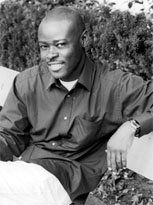
Helon Habila
Biography
Helon Habila is the author of two novels, Measuring Time and Waiting for an Angel, winner of the Caine Prize and the Commonwealth Writers Prize. He is also the author of the biography Mai Kaltungo (1997). In 2005–2006 he was the first Chinua Achebe Fellow at Bard College in New York. He currently teaches creative writing at George Mason University in Fairfax, Virginia. He has been a contributing editor to VQR since 2004.

